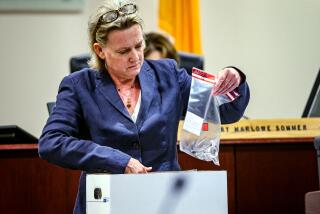New trial is sought in arsenic case
- Share via
SAN DIEGO — In January a jury convicted Cynthia Sommer of poisoning her Marine sergeant husband by slipping him a fatal dose of arsenic.
But her new attorney, hired after her conviction, believes that the jury convicted Sommer not because of evidence concerning arsenic but because of testimony about her unusual behavior in the weeks after her husband’s death.
He says she deserves a new trial untainted by shocking testimony about sex, booze and breasts -- testimony the judge initially said would not be allowed.
Witnesses called by the prosecution said Sommer used her husband’s insurance money to have her breasts enlarged, had sex with three Marines, held raucous parties, and performed in a thong and wet T-shirt contest in a Tijuana bar, flashing her breasts.
Allen Bloom, one of the city’s best-known defense attorneys, said testimony about Sommer’s behavior was so repugnant to jurors that it prompted them to convict her of first-degree murder despite the lack of evidence that she ever bought arsenic. Bloom also criticized prosecutors’ use of what he termed “fuzzy” science on the effects of arsenic on the body.
The testimony about her “post-death” behavior “cast Cindy with a Scarlet Letter as a wanton woman,” Bloom said.
With Sommer, 34, a mother of four, facing a mandatory sentence of life in prison without parole, Bloom has filed a motion for a new trial.
He also asserts that a juror -- a retired San Diego police officer -- improperly discussed the case with other jurors and that Sommer’s first attorney failed to mount an adequate defense against the arsenic allegation.
Although motions for new trials are common, the reaction by the trial judge, Peter Deddeh of San Diego County Superior Court, has been highly unusual, veteran defense attorneys say.
Deddeh has asked Sommer’s trial attorney, Robert Udell, to return to San Diego from Florida to answer Bloom’s allegations that he bungled Sommer’s defense. Udell’s trial work, Bloom said, was “passionate but unfocused.”
A hearing is set for Friday. Udell has conceded, in court papers, that he made errors during the trial; he was working on a motion for a new trial when the case was taken over by Bloom.
At the beginning of the trial, Deddeh told prosecutors that he would not allow “lifestyle” evidence because it had little to do with whether Sommer, as prosecutors alleged, tricked her husband, Todd, into ingesting a fatal dose of arsenic so she could collect his life insurance.
The 23-year-old sergeant died in February 2002 after collapsing at the couple’s apartment at Marine Corps Air Station Miramar. At first, a pathologist suggested that the death was due to a heart attack; months later, an examination of Todd Sommer’s organs found large amounts of arsenic in his liver and kidneys.
Sommer had moved to Palm Beach County in Florida, with a former Marine and her children: one from her marriage to Todd Sommer, three from a former marriage.
At trial, Udell called Cynthia Sommer’s mother to testify that, in the days after the death, Cynthia Sommer curled into a fetal position on her bed and wept. Sommer got a tattoo with her husband’s name, birth date, date of death and the Latin words semper fidelis, or “always faithful,” the Marine Corps motto.
Udell’s decision to call Sommer’s mother allowed the prosecution to call its own witnesses to rebut the assertion that Sommer was a grieving widow.
Marines with whom Sommer had sex were called; witnesses testified about her baring her breasts during a thong and wet T-shirt contest; neighbors testified about drunken parties; one Marine testified that both he and his wife had sex with Sommer in a “threesome.”
Prosecutors presented evidence that Sommer had been charged in Florida with mistreating her children.
If granted a new trial, Bloom said, he is ready to present experts to assert that Todd Sommer died of the effects of the now-banned weight loss pill Ephedra or a prescription drug taken for diarrhea or a rare, undiagnosed condition.
To win a new trial on grounds of ineffective counsel, a lawyer usually has two hurdles to overcome: Was the previous lawyer’s conduct not only bad but also verging on incompetent? Was the disputed evidence so strong that it prejudiced the jury against the defendant?
The district attorney’s office says Bloom’s assertion fails both tests.
Deputy Dist. Atty. Laura M. Gunn argued in a written response to Bloom’s motion that “the law does not contemplate the granting of a new trial motion every time a new attorney comes in and can demonstrate that he might have done a more effective job.”
“The law guarantees a fair trial, not a perfect trial,” Gunn wrote.
Mike Brennan, a former deputy federal public defender who teaches criminal law at USC Gould School of Law, said a motion asking the trial judge for a new trial is rarely granted. Disputing another attorney’s trial tactics, he said, is also a long shot.
Bloom said he knows that the odds do not favor new-trial motions.
But he said the Sommer case was the exception: that his client had no chance for a fair trial once a jury was scandalized by her drinking, partying and sexual activity.
“It became the tail that wagged the dog,” he said.
More to Read
Sign up for Essential California
The most important California stories and recommendations in your inbox every morning.
You may occasionally receive promotional content from the Los Angeles Times.










